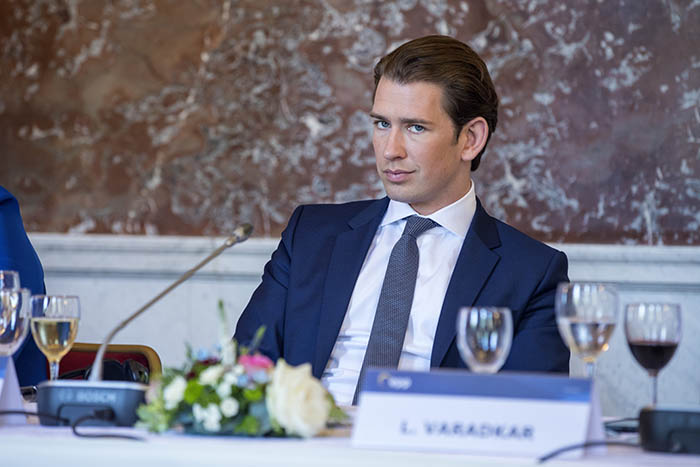[vc_row][vc_column][vc_column_text]

Austrian chancellor Sebastian Kurz. Credit: European People’s Party/Flickr
In an email sent to all regional police departments on 24 September 2018, Austria’s Ministry of the Interior suggested limiting communication with “certain media outlets”, including the weekly news magazine Falter and the daily newspaper Der Standard.
The ministry was quick to clarify that Herbert Kickl of the far-right Freedom Party of Austria (FPÖ), who heads the department, had nothing to do with the email, but that it was the work of a ministry spokesperson. It stressed that it supports “fair co-operation with all media outlets” and announced that new guidelines for media transparency are in the works.
Chancellor Sebastian Kurz and president Alexander Van der Bellen also immediately distanced themselves from the email, making it clear that any restrictions on press freedom are unacceptable. However, Austria is the last country in the European Union where official secrecy outweighs the right to know on a constitutional level. The Global Right to Information Rating ranks the country in the bottom 10 globally for the right to access information held by public authorities.
The country’s General Information Act, which regulates the right to apply for information, does not guarantee journalists and NGOs a general right of access. As a result, state bodies are free to refuse information without having to justify their decision.
Current regulation offers much room for interpretation, leaving public officials with scant guidance on deciding whether to make the requested information public. Despite a recommendation in 2008 by the Council of Europe’s anti-corruption monitoring body to introduce clearer criteria on what kind of information can be limited, reform has yet to materialise.
As any breach of official secrecy law could result in mandatory resignation, public officials seldom exercise their duty to inform. This leads to secrecy being the rule and informing the exception. Journalists also have no guaranteed right to access government documents.
Mathias Huter, secretary general of Forum Informationsfreiheit, a right-to-know NGO, told Index on Censorship that the lack of a freedom of information act undermines the ability of journalists to investigate, making it difficult to hold politicians accountable.
“Investigative reporting remains highly dependent on leaks from inside the administration,” he said. “These leaks, however, usually only tell one part of the story – and often support a government narrative.”
In 2013 Kurz, then State Secretary for Integration, endorsed a campaign to introduce a transparency act. While the campaign itself evolved into the establishment of Forum Informationsfreiheit, Kurz’s enthusiasm for the issue has since waned.
“Kurz has so far failed to deliver on his promise to advance government transparency,” Mathias Huter, secretary general of Forum Informationsfreiheit, told Index. “At the same time, his party has supported several initiatives that expand surveillance and reduce civic space. There is no indication that the ruling parties have any interest in abolishing the official secrecy provision in the Austrian constitution and to replace it with a right to information.”
Restrictions on access to information leave media outlets vulnerable to political attempts to influence news coverage. Florian Skrabal, co-founder and editor-in-chief of the investigative journalism platform Dossier, told Index: “This information asymmetry bears the risk of political alliances forming. Information becomes a good you can bargain with. Every now and then, the phenomenon of journalists with valuable contacts with high-ranking public officials, who suddenly get exclusive information, shows the existence of such political alliances.”
Even if a law granting access to information was in place, Skrabal says it would take years to change the existing culture of treating information as a public good rather than the property of a public body.
Speaking at Austria Österreichische Medientage, an annual conference for media, marketing, communications professionals, in September 2018, Christian Rainer, editor-in-chief of the weekly magazine Profil, described the Ministry of the Interior’s email as an exposure of a practice that usually happens silently, behind closed doors and is not publicly discussed.
But such practice isn’t limited to the current government. In 2016 former chancellor of the Austrian Social Democratic Party (SPÖ), Christian Kern, temporarily boycotted Österreichischer Rundfunk (ORF), the Austrian national public service broadcaster. In 2017 he refused to give interviews to or book ads in the daily tabloid Österreich during the election campaign after the paper published an article deemed too personal and offensive. The article included a leaked email which was sent to former SPÖ political adviser Tal Silberstein describing Kern as a “princess” and “insecure”.
Also speaking at Austria Österreichische Medientage was Wolfgang Fellner, founder and editor-in-chief of the daily newspaper Österreich, highlighted how existing relationships between political parties and certain media outlets — in particular Kronen Zeitung, the largest print media in Austria — affect journalistic practices: “The interior ministry feeds the Kronen Zeitung with exclusive stories, which, in return, is rewarded with positive news coverage.”
“The interior ministry’s email shows the attitude and culture prevalent in Austria regarding information as a negotiable good,” Skrabal told Index. “A journalist becomes a supplicant for information. The leaked email is simply a revelation of an existing mindset on how politicians communicate with the media. That is to distinguish between ‘good’ and ‘bad’ media and, on that basis, to weigh who is eligible to get informed and who does not.”[/vc_column_text][/vc_column][/vc_row][vc_row][vc_column][vc_basic_grid post_type=”post” max_items=”4″ element_width=”6″ grid_id=”vc_gid:1543917445052-57c4ff25-a62a-6″ taxonomies=”6564″][/vc_column][/vc_row]




